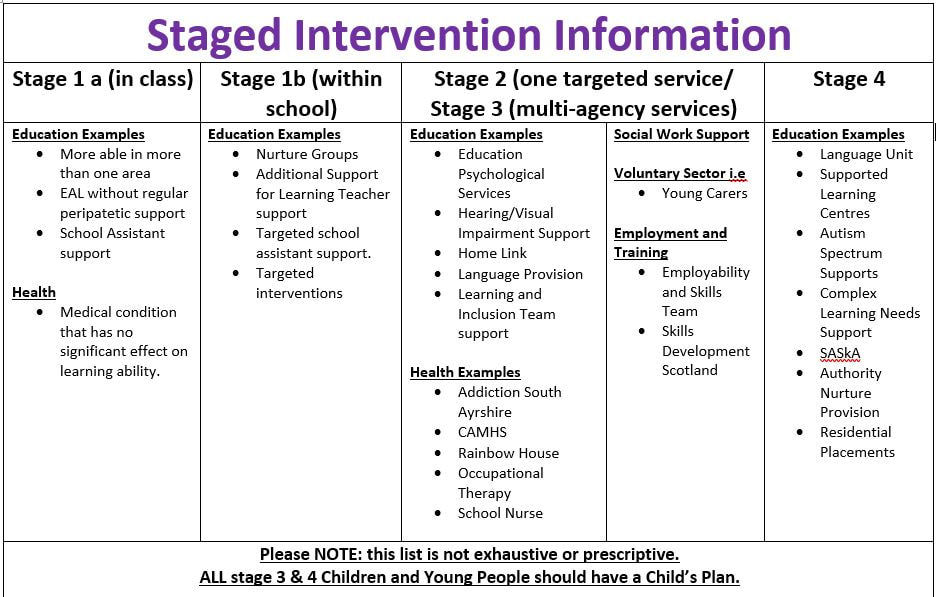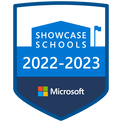Student Support and Development
All children and young people need support to help them benefit from education. The main sources of support are school staff who, through good inclusive practice, are able to meet a diverse range of needs. With good learning and teaching and the provision of appropriately differentiated tasks, most children and young people are able to benefit from education without the provision of any additional support.
However, any child or young person could, at some time in their school career, need something additional to, or different from, the support given generally to most of their peers in order to help them overcome a barrier to their learning and benefit from school education. These children and young people have additional support needs and they are entitled to additional support for learning to help them achieve their full potential.
However, any child or young person could, at some time in their school career, need something additional to, or different from, the support given generally to most of their peers in order to help them overcome a barrier to their learning and benefit from school education. These children and young people have additional support needs and they are entitled to additional support for learning to help them achieve their full potential.
Who We Are
Principal TeachersMrs F Young -Student Support
Mr K Bell - Fullarton Mrs J Cooper -Darley Mr R Connell - Darley Mr S Harris - Lothian Miss H Madden- Welbeck Mr S Reid - Portland Teaching StaffMrs F Young - Fullarton
Ms M Elliot -Portland/Lothian Mrs V McRae - Wellbeck/Darley Ms L Good (Covid Recovery) |
School AssistantsMrs P Brown
Mrs C SInclair Mrs L Duncan Ms E Marsh Mrs L McCartan Miss C McGill Ms T Robertson Mr G Shearer Welfare OfficerMrs J Scott
|
Partnerships
Ms L Gray - Home Link
Ms Y Coyle- Ed Psych Mrs G Fraser – SDS |
What We Do
Our Pupil Support staff offer our students, parents and staff advice and support to allow everyone access to the curriculum at an appropriate level. This ranges from help to construct differentiated materials, strategies to support students and staff with specific difficulties and in-class support for pupils. The use of ICT and concessions such as reader/scribes are also used where and when appropriate. Pupils who have additional support needs may also receive assistance within school from other professionals, e.g. The School Counsellor, Autism Outreach Service and Hearing/Visual Impairment Service.
The school works within South Ayrshire Council’s staged intervention framework to identify and meet the needs of pupils with additional support needs. Staged Intervention paperwork is also shared with school staff on individuals’ needs and how these can best be addressed. In accordance with school and local authority policy, Pupil Support teachers and School Assistant’s support pupils within the classroom, but additional support can also be offered within the Pupil Support department’s facilities. Close liaison between Head of House, class teachers, Guidance staff, Pupil Support teachers, School Assistant’s and parents help to ensure that the educational provision is appropriate for all pupils
The school works within South Ayrshire Council’s staged intervention framework to identify and meet the needs of pupils with additional support needs. Staged Intervention paperwork is also shared with school staff on individuals’ needs and how these can best be addressed. In accordance with school and local authority policy, Pupil Support teachers and School Assistant’s support pupils within the classroom, but additional support can also be offered within the Pupil Support department’s facilities. Close liaison between Head of House, class teachers, Guidance staff, Pupil Support teachers, School Assistant’s and parents help to ensure that the educational provision is appropriate for all pupils
Alternative Assessment Arrangements
Evidence for additional assessment arrangements for pupils with additional support needs is gathered throughout each pupil’s school career and put in place for all assessments and SQA exams. These arrangements may include the use of Digital Question Papers (where a computer is used to “read” text to pupils and access to a spellchecker can overcome spelling difficulties), Reader/Scribe (where someone would read and write text as required), transcription, extra-time or other appropriate strategies.
GIRFECInclusive Practice and Dyslexia Friendly Schools
How to download and use Read&Write software.
|
Health and WellbeingWe have a dedicated section for Mental Health and Wellbeing which can be accessed here.
|













